Unit 6 Do you like bananas? Section A (grammar focus-3c)课件(共28张PPT)2023-2024学年人教版英语七年级上册
文档属性
| 名称 | Unit 6 Do you like bananas? Section A (grammar focus-3c)课件(共28张PPT)2023-2024学年人教版英语七年级上册 |
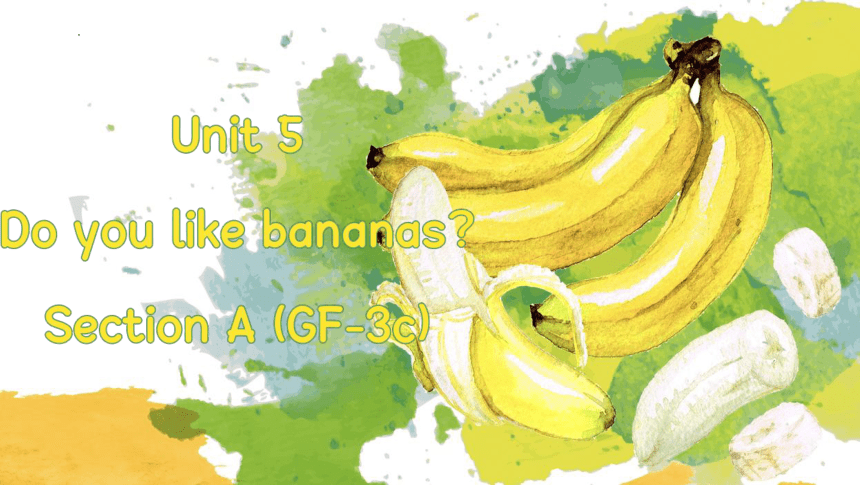
|
|
| 格式 | pptx | ||
| 文件大小 | 8.2MB | ||
| 资源类型 | 教案 | ||
| 版本资源 | 人教新目标(Go for it)版 | ||
| 科目 | 英语 | ||
| 更新时间 | 2023-11-28 00:00:00 | ||
图片预览

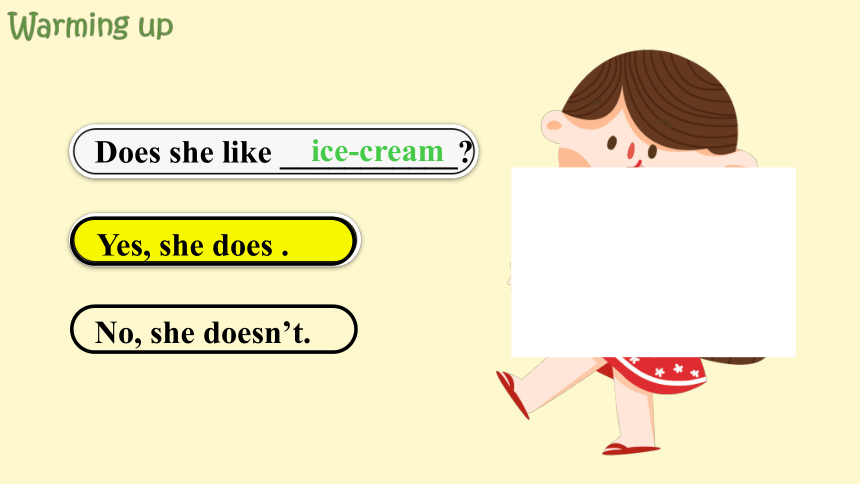
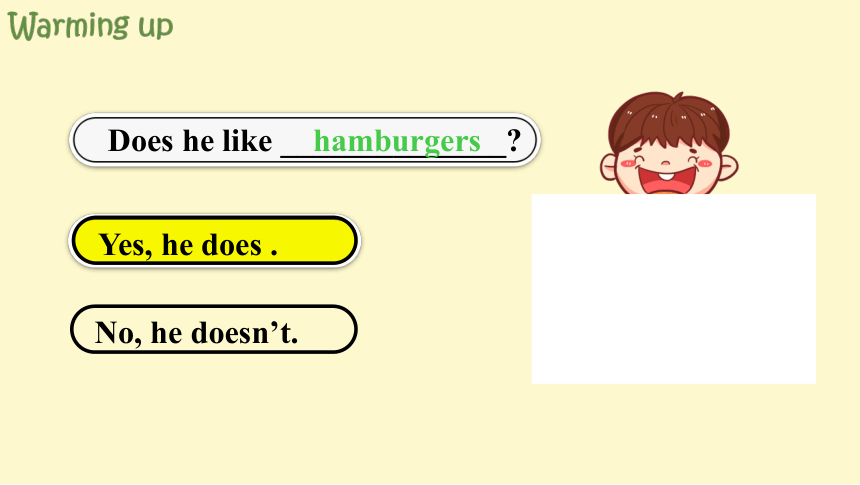
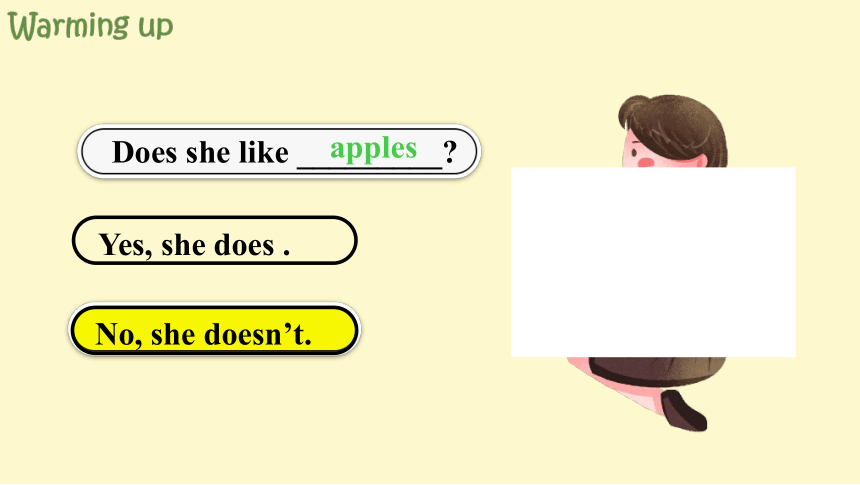
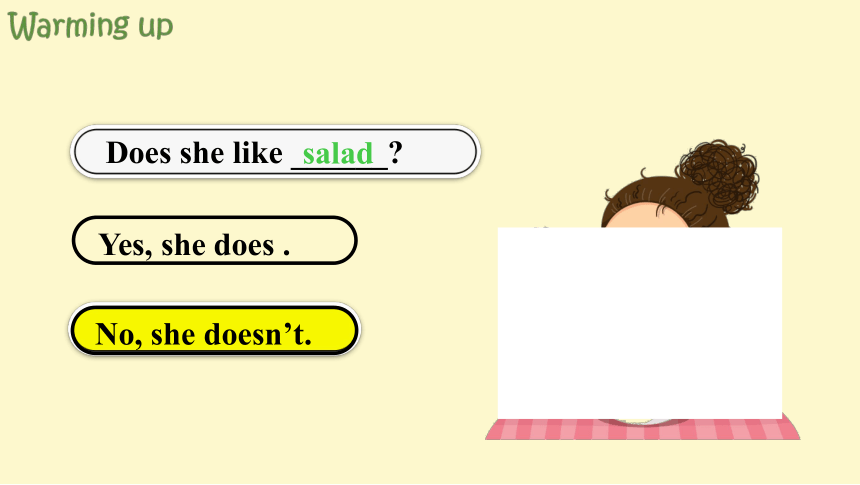

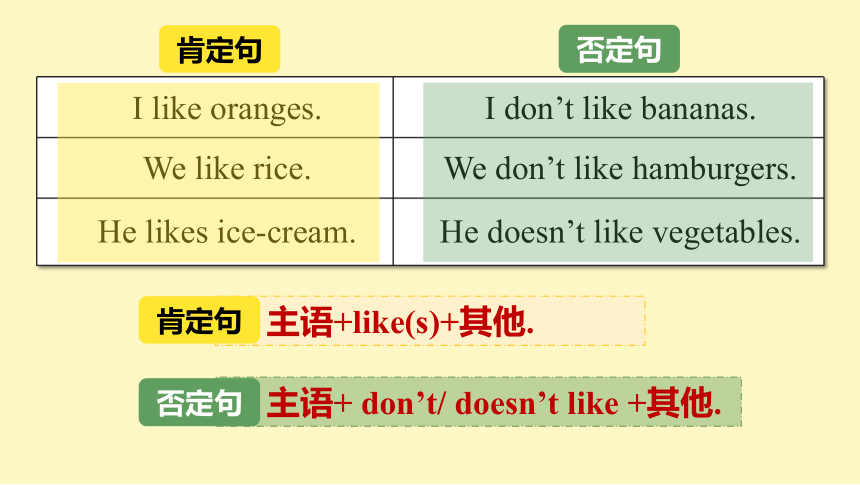
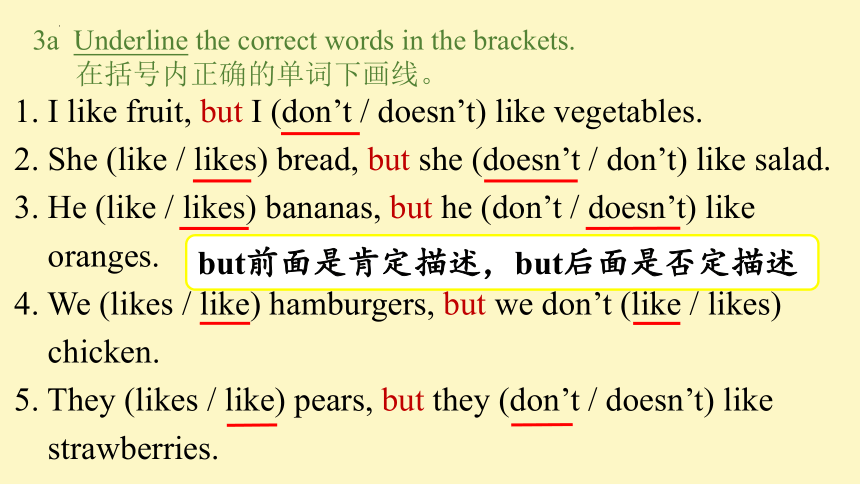
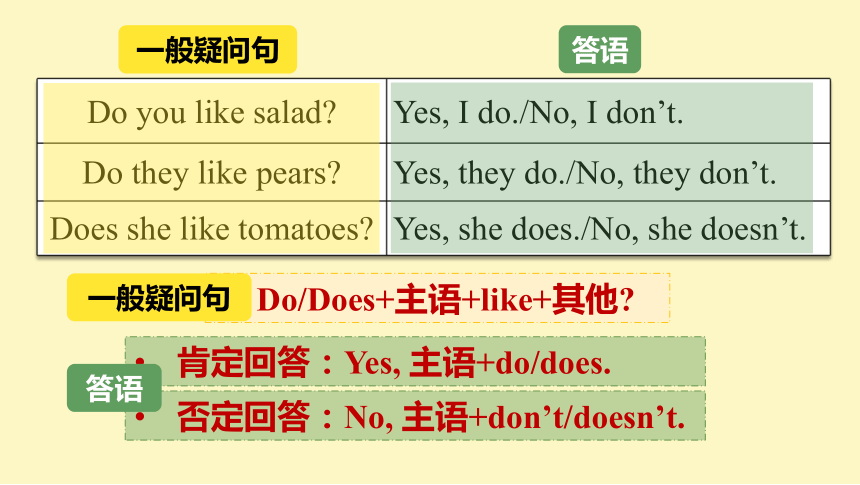
文档简介
(共28张PPT)
Does she like ___________
ice-cream
Yes, she does .
No, she doesn’t.
Does he like ______________
hamburgers
Yes, he does .
No, he doesn’t.
Does she like _________
apples
Yes, she does .
No, she doesn’t.
Does she like ______
salad
Yes, she does .
No, she doesn’t.
Does she like _________
bread
Yes, she does .
No, she doesn’t.
I like oranges. I don’t like bananas.
We like rice. We don’t like hamburgers.
He likes ice-cream. He doesn’t like vegetables.
主语+like(s)+其他.
主语+ don’t/ doesn’t like +其他.
肯定句
否定句
肯定句
否定句
1. I like fruit, but I (don’t / doesn’t) like vegetables.
2. She (like / likes) bread, but she (doesn’t / don’t) like salad.
3. He (like / likes) bananas, but he (don’t / doesn’t) like
oranges.
4. We (likes / like) hamburgers, but we don’t (like / likes)
chicken.
5. They (likes / like) pears, but they (don’t / doesn’t) like
strawberries.
3a Underline the correct words in the brackets.
在括号内正确的单词下画线。
but前面是肯定描述,but后面是否定描述
否定回答:No, 主语+don’t/doesn’t.
Do you like salad Yes, I do./No, I don’t.
Do they like pears Yes, they do./No, they don’t.
Does she like tomatoes Yes, she does./No, she doesn’t.
一般疑问句
答语
Do/Does+主语+like+其他
一般疑问句
肯定回答:Yes, 主语+do/does.
答语
I. Write sentences as required.
1. — Do you like tomatoes (作否定回答)
— ____, ____ ______.
2. They like salad. (变为一般疑问句)
____ they ____ salad
3. — Does Mary like milk (作肯定回答)
— ____, ____ ____.
4. My aunt likes watching TV plays. (改为否定句)
My aunt ______ ____ watching TV plays.
Write sentences as required.
1. — Do you like tomatoes (作否定回答)
— , .
2. They like salad. (变为一般疑问句)
they salad
3. — Does Mary like milk (作肯定回答)
— , .
4. My aunt likes watching TV plays. (改为否定句)
My aunt watching TV plays.
Practice
No
I
don’t
Do
like
Yes
she
does
doesn’t
like
Write sentences as required.
5. Mary likes fruit salad. (改为一般疑问句)
_______ Mary _______ fruit salad
6. They like bananas for dinner. (改为否定句)
They _______ _______ bananas for dinner.
7. —Does your sister like oranges (作否定回答)
—_______, _______ _______.
8. Paul likes milk. He doesn’t like bread. (合为一句)
Paul likes milk, _______ he doesn’t like bread.
Does
don’t
No
but
like
like
she
doesn’t
Practice
可数名词 不可数名词 既可作可数名词又可作不可数名词的词
hamburgers, eggs, oranges, bananas, apples, pears, carrots, vegetables, tomatoes, strawberries milk, bread, rice food, fruit, ice-cream, salad, chicken
胡萝卜
大米; 米饭
鸡;鸡肉
n.鸡蛋 an egg 一个鸡蛋
【可数名词】
(1)定义:是_______计数的名词
(2)可数名词前可以用______限定, 表示一个……
(3)可数名词前可以用one, two, three ...限定。
(4)可数名词_____复数形式。
【不可数名词】
(1)定义:是指______计数的名词。
(2)不可数名词前不可以用a, an限定。
(3)不可数名词前不可以用one, two, three ...限定。
(4)不可数名词_______复数形式。
可以
a, an
有
不能
没有
可数名词和不可数名词
语法探究
可数名词复数形式变化规则
语法探究
构成方法 例词
1) 一般情况 词尾加-s book-books
2) 以s,x, sh, ch 结尾的词 词尾加-es box-boxes
3) 以“辅音字母 +y”结尾的词 变y为i再加-es strawberry-strawberries
4) 以f或fe结尾 的词 变f或fe为v再加-es knife-knives
5) 以字母o结尾 的词 有生命意义的在词尾加-es tomato-tomatoes
无生命意义的在词尾加-es photo-photos
以 o结尾的名词变复数加-es的有:
英雄(hero)爱吃西红柿(tomato)和土豆(potato)
类别 单数 复数
单复数同形 deer(鹿) deer
Chinese(中国人) Chinese
sheep(绵羊) sheep
可数名词复数形式不规则变化
语法探究
类别 单数 复数
单复数不同形 词尾发生变化 child(小孩) children
改变单词的元音字母 woman(妇女) women
man(男人) men
tooth(牙齿) teeth
foot(脚) feet
可数名词复数形式不规则变化
语法探究
粉末/颗粒类,如:flour 面粉,rice 米饭
液体、气体等,如:water 水,air 空气
语言、学科等,如:English 英语,Chinese 汉语
肉类,如:beef 牛肉,chicken 鸡肉
油脂类,如:oil 油,butter 黄油
一些抽象名词,如:knowledge 知识,love 爱
常见的不可数名词
语法探究
用法 例句
food [U]食物总称 [C]特定种类的食品复数形式:foods The food here is very delicious.
这儿的食物很美味。
frozen foods 冷冻食品
fruit [U]水果总称 [C]水果种类 复数形式:fruits I eat some fruit every day.
我每天都吃一些水果。
Apples, bananas and pears are my favorite fruits. 苹果、香蕉和梨是我最喜欢的水果。
既可作可数名词又可作不可数名词的词
语法探究
用法 例句
ice-cream [U]泛指冰激凌 [C]特指冰激凌作为一份食物 一份冰激凌 an ice-cream I like ice-cream.
我喜欢冰激凌。
Please give me an ice-cream.
请给我一份冰激凌。
salad [U]泛指沙拉 [C]特指沙拉作为一份食物 Would you like some salad with your pasta 你的意大利面要配些沙拉吗?
a side salad 配菜沙拉
既可作可数名词又可作不可数名词的词
语法探究
有些名词既可作可数名词,又可作不可数名词, 但词义不同。
语法探究
chicken
[U]鸡肉
[C]鸡
I. Write the plural forms of the words.
1. box ______ 2. apple ______
3. orange _______ 4. strawberry ___________
5. radio ______ 6. egg ____
7. carrot ______ 8. photo ______
9. tomato ________ 10. library ________
boxes
apples
oranges
strawberries
radios
eggs
carrots
photos
tomatoes
libraries
Practice
II. Fill in the blanks with the correct forms.
1. My brother likes _____________(hamburger) a lot.
2. Would you like a glass of _______ (milk)
3. Please get me a piece of _______ (bread).
4. I like tomatoes, but I don’t like _____________
(strawberry).
5. I have some _______(rice) for lunch.
hamburgers
milk
bread
strawberries
rice
Practice
3b Number these sentences [1-4] to make a conversation.
将句子编号,组成对话。
So, let’s get salad. Yes, I do. Do you like salad OK.
3
2
1
4
A: Do you like salad
B: Yes, I do.
A: So, let’s get salad.
B: OK.
so conj. 那么
→位于句首用于引出评论或问题
So what are you going to do next
那么接下来你要做什么?
3c Ask your classmates about the food in the chart. Find out what
they like and don’t like. 调查你的同学,看看表中的食物他们喜
欢什么,不喜欢什么。
Food Likes Doesn’t like
ice-cream Liu Li Zhao Jun
hamburgers
oranges
milk
salad
strawberries
tomatoes
bananas
Fill in the blanks with correct forms.
1. Selina _____ (like) apples.
2. ______ your father _____ (like) eggs
3. He ___________ (not like) rice.
4. I have some _____ (egg).
5. I don’t like _____ (milk).
6. My sister likes _________ (tomato), but I don’t.
7. Do you like _______ (chicken)
likes
like
Does
doesn’t like
eggs
milk
tomatoes
chicken
Exercises
like在一般现在时中的用法
第三人称单数
其他人称
He/She likes ...
He/She doesn’t like ...
Does he/she like ...
I/We/They like ...
I/We/They don’t like ...
Do you/they like ...
名词的数
可数
既可数又不可数
milk, bread, rice
ice-cream, salad, chicken, food, fruit
语法
不可数
banana, hamburger, tomato, strawberry, pear, apple
Does she like ___________
ice-cream
Yes, she does .
No, she doesn’t.
Does he like ______________
hamburgers
Yes, he does .
No, he doesn’t.
Does she like _________
apples
Yes, she does .
No, she doesn’t.
Does she like ______
salad
Yes, she does .
No, she doesn’t.
Does she like _________
bread
Yes, she does .
No, she doesn’t.
I like oranges. I don’t like bananas.
We like rice. We don’t like hamburgers.
He likes ice-cream. He doesn’t like vegetables.
主语+like(s)+其他.
主语+ don’t/ doesn’t like +其他.
肯定句
否定句
肯定句
否定句
1. I like fruit, but I (don’t / doesn’t) like vegetables.
2. She (like / likes) bread, but she (doesn’t / don’t) like salad.
3. He (like / likes) bananas, but he (don’t / doesn’t) like
oranges.
4. We (likes / like) hamburgers, but we don’t (like / likes)
chicken.
5. They (likes / like) pears, but they (don’t / doesn’t) like
strawberries.
3a Underline the correct words in the brackets.
在括号内正确的单词下画线。
but前面是肯定描述,but后面是否定描述
否定回答:No, 主语+don’t/doesn’t.
Do you like salad Yes, I do./No, I don’t.
Do they like pears Yes, they do./No, they don’t.
Does she like tomatoes Yes, she does./No, she doesn’t.
一般疑问句
答语
Do/Does+主语+like+其他
一般疑问句
肯定回答:Yes, 主语+do/does.
答语
I. Write sentences as required.
1. — Do you like tomatoes (作否定回答)
— ____, ____ ______.
2. They like salad. (变为一般疑问句)
____ they ____ salad
3. — Does Mary like milk (作肯定回答)
— ____, ____ ____.
4. My aunt likes watching TV plays. (改为否定句)
My aunt ______ ____ watching TV plays.
Write sentences as required.
1. — Do you like tomatoes (作否定回答)
— , .
2. They like salad. (变为一般疑问句)
they salad
3. — Does Mary like milk (作肯定回答)
— , .
4. My aunt likes watching TV plays. (改为否定句)
My aunt watching TV plays.
Practice
No
I
don’t
Do
like
Yes
she
does
doesn’t
like
Write sentences as required.
5. Mary likes fruit salad. (改为一般疑问句)
_______ Mary _______ fruit salad
6. They like bananas for dinner. (改为否定句)
They _______ _______ bananas for dinner.
7. —Does your sister like oranges (作否定回答)
—_______, _______ _______.
8. Paul likes milk. He doesn’t like bread. (合为一句)
Paul likes milk, _______ he doesn’t like bread.
Does
don’t
No
but
like
like
she
doesn’t
Practice
可数名词 不可数名词 既可作可数名词又可作不可数名词的词
hamburgers, eggs, oranges, bananas, apples, pears, carrots, vegetables, tomatoes, strawberries milk, bread, rice food, fruit, ice-cream, salad, chicken
胡萝卜
大米; 米饭
鸡;鸡肉
n.鸡蛋 an egg 一个鸡蛋
【可数名词】
(1)定义:是_______计数的名词
(2)可数名词前可以用______限定, 表示一个……
(3)可数名词前可以用one, two, three ...限定。
(4)可数名词_____复数形式。
【不可数名词】
(1)定义:是指______计数的名词。
(2)不可数名词前不可以用a, an限定。
(3)不可数名词前不可以用one, two, three ...限定。
(4)不可数名词_______复数形式。
可以
a, an
有
不能
没有
可数名词和不可数名词
语法探究
可数名词复数形式变化规则
语法探究
构成方法 例词
1) 一般情况 词尾加-s book-books
2) 以s,x, sh, ch 结尾的词 词尾加-es box-boxes
3) 以“辅音字母 +y”结尾的词 变y为i再加-es strawberry-strawberries
4) 以f或fe结尾 的词 变f或fe为v再加-es knife-knives
5) 以字母o结尾 的词 有生命意义的在词尾加-es tomato-tomatoes
无生命意义的在词尾加-es photo-photos
以 o结尾的名词变复数加-es的有:
英雄(hero)爱吃西红柿(tomato)和土豆(potato)
类别 单数 复数
单复数同形 deer(鹿) deer
Chinese(中国人) Chinese
sheep(绵羊) sheep
可数名词复数形式不规则变化
语法探究
类别 单数 复数
单复数不同形 词尾发生变化 child(小孩) children
改变单词的元音字母 woman(妇女) women
man(男人) men
tooth(牙齿) teeth
foot(脚) feet
可数名词复数形式不规则变化
语法探究
粉末/颗粒类,如:flour 面粉,rice 米饭
液体、气体等,如:water 水,air 空气
语言、学科等,如:English 英语,Chinese 汉语
肉类,如:beef 牛肉,chicken 鸡肉
油脂类,如:oil 油,butter 黄油
一些抽象名词,如:knowledge 知识,love 爱
常见的不可数名词
语法探究
用法 例句
food [U]食物总称 [C]特定种类的食品复数形式:foods The food here is very delicious.
这儿的食物很美味。
frozen foods 冷冻食品
fruit [U]水果总称 [C]水果种类 复数形式:fruits I eat some fruit every day.
我每天都吃一些水果。
Apples, bananas and pears are my favorite fruits. 苹果、香蕉和梨是我最喜欢的水果。
既可作可数名词又可作不可数名词的词
语法探究
用法 例句
ice-cream [U]泛指冰激凌 [C]特指冰激凌作为一份食物 一份冰激凌 an ice-cream I like ice-cream.
我喜欢冰激凌。
Please give me an ice-cream.
请给我一份冰激凌。
salad [U]泛指沙拉 [C]特指沙拉作为一份食物 Would you like some salad with your pasta 你的意大利面要配些沙拉吗?
a side salad 配菜沙拉
既可作可数名词又可作不可数名词的词
语法探究
有些名词既可作可数名词,又可作不可数名词, 但词义不同。
语法探究
chicken
[U]鸡肉
[C]鸡
I. Write the plural forms of the words.
1. box ______ 2. apple ______
3. orange _______ 4. strawberry ___________
5. radio ______ 6. egg ____
7. carrot ______ 8. photo ______
9. tomato ________ 10. library ________
boxes
apples
oranges
strawberries
radios
eggs
carrots
photos
tomatoes
libraries
Practice
II. Fill in the blanks with the correct forms.
1. My brother likes _____________(hamburger) a lot.
2. Would you like a glass of _______ (milk)
3. Please get me a piece of _______ (bread).
4. I like tomatoes, but I don’t like _____________
(strawberry).
5. I have some _______(rice) for lunch.
hamburgers
milk
bread
strawberries
rice
Practice
3b Number these sentences [1-4] to make a conversation.
将句子编号,组成对话。
So, let’s get salad. Yes, I do. Do you like salad OK.
3
2
1
4
A: Do you like salad
B: Yes, I do.
A: So, let’s get salad.
B: OK.
so conj. 那么
→位于句首用于引出评论或问题
So what are you going to do next
那么接下来你要做什么?
3c Ask your classmates about the food in the chart. Find out what
they like and don’t like. 调查你的同学,看看表中的食物他们喜
欢什么,不喜欢什么。
Food Likes Doesn’t like
ice-cream Liu Li Zhao Jun
hamburgers
oranges
milk
salad
strawberries
tomatoes
bananas
Fill in the blanks with correct forms.
1. Selina _____ (like) apples.
2. ______ your father _____ (like) eggs
3. He ___________ (not like) rice.
4. I have some _____ (egg).
5. I don’t like _____ (milk).
6. My sister likes _________ (tomato), but I don’t.
7. Do you like _______ (chicken)
likes
like
Does
doesn’t like
eggs
milk
tomatoes
chicken
Exercises
like在一般现在时中的用法
第三人称单数
其他人称
He/She likes ...
He/She doesn’t like ...
Does he/she like ...
I/We/They like ...
I/We/They don’t like ...
Do you/they like ...
名词的数
可数
既可数又不可数
milk, bread, rice
ice-cream, salad, chicken, food, fruit
语法
不可数
banana, hamburger, tomato, strawberry, pear, apple
同课章节目录
- starters 预备篇(2012秋审查)
- Unit 1 Good morning !
- Unit 2 What’s this in English?
- Unit 3 What color is it ?
- Unit 1 My name's Gina.
- Section A
- Section B
- Unit 2 This is my sister.
- Section A
- Section B
- Unit 3 Is this your pencil?
- Section A
- Section B
- Unit 4 Where's my schoolbag?
- Section A
- Section B
- Unit 5 Do you have a soccer ball?
- Section A
- Section B
- Unit 6 Do you like bananas?
- Section A
- Section B
- Unit 7 How much are these socks?
- Section A
- Section B
- Unit 8 When is your birthday?
- Section A
- Section B
- Unit 9 My favorite subject is science.
- Section A
- Section B
